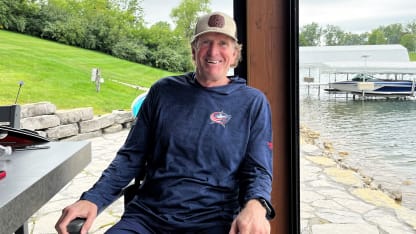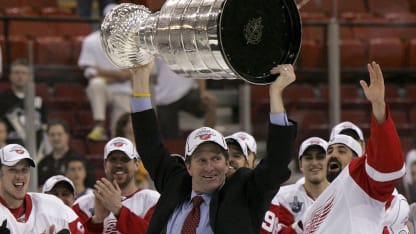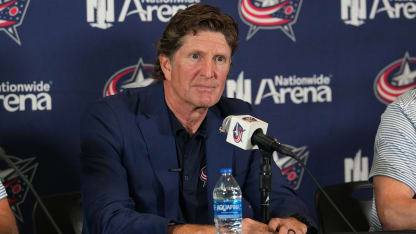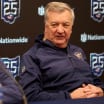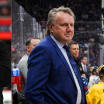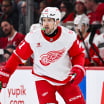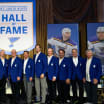Mike Babcock, one of the most accomplished coaches in hockey history, is taking over the Columbus Blue Jackets this season in his first NHL job since the Toronto Maple Leafs fired him as coach Nov. 20, 2019.
NHL.com visited him at his home in suburban Detroit to talk about why he decided to coach in Columbus, how he plans to communicate better with players this time, and what he thinks of the Blue Jackets.
This is the first story in a three-part series. (Part 2 | Part 3)
BRIGHTON, Mich. -- Mike Babcock looks relaxed and happy. It’s a quiet morning in August, and he’s already worked out and water skied when he sits down at his “tiki bar,” a little piece of paradise down the hill from his house overlooking a lake. It has a roof, a bar, barstools, a fridge, a TV and wifi. There are hockey mementos on the wall.
Babcock spends a lot of time here, when he isn’t hunting on his land in Ohio or downhill skiing on a mountain in Colorado or vacationing at his place in Palm Springs, California. He and his wife, Maureen, love to visit their three adult children scattered across North America.
“My life has simply been about being around my family and hunting, water skiing and downhill skiing,” he says. “Those are the three things that I’ve done to bring me nothing but joy.”
The 60-year-old hasn’t coached an NHL game since the Toronto Maple Leafs fired him Nov. 20, 2019. He says he declined multiple opportunities until he joined the Columbus Blue Jackets on July 1, volunteering instead as an adviser at the University of Vermont in 2020-21 and the coach at the University of Saskatchewan in 2021-22.
“I said I was going to retire at 60,” he says. “I promised my wife. The 3 1/2 years early was like a gift from God. We enjoyed it so much.”
So why come back to the NHL now? Why take on the challenge of the Blue Jackets, who finished 31st in the NHL last season?
“This is a great question,” he says.
Babcock had 3 1/2 years left on his record contract with the Maple Leafs, so he had the luxury of receiving a large paycheck while he wasn’t coaching in the NHL. The contract expired. But it’s not like he needs the money.
He didn’t like how things ended in Toronto, especially with negative stories surfacing about how he interacted with players in the past. But it’s not like he has anything to prove, either.
He ranks 12th in regular-season wins (700) and eighth in Stanley Cup Playoff wins (90) in NHL history. He has won the Stanley Cup (2008 with the Detroit Red Wings) and been to Game 7 of the Stanley Cup Final twice (2003 with the Mighty Ducks of Anaheim and 2009 with the Red Wings).
